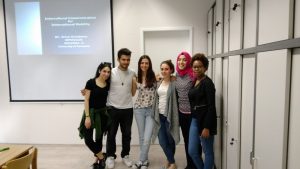Mobility opportunities for foreign students
This month we are focusing on the introduction of those scholarship programs that are offered to foreign students who wish to study in Hungary. You already learned about the Chinese group’s arrival in the spring semester, so now it’s time to update you on European students and their opportunities.

Dr. Irina Golubeva, who is in charge of the International Mobility Office at the University of Pannonia was really kind to share with us a few thoughts on how these programs actually run.
To start with, I would like to call your attention to 3 excellent programs that are most used by students. To name the first one is the Erasmus+ that is well known by us, Hungarians, too. It is proposed by the European Commission, and available to all students and academic staff in all EU Member States. This academic year, most of the students came from Finland, Germany, Greece, Italy and Turkey.
I must also mention the Stipendium Hungaricum Scholarship Programme getting more and more popular among foreign students. It was launched by the Hungarian Government in 2013 and is available for bachelor, master, one-tier master, doctoral and non-degree programmes (preparatory courses). According to the information provided by the International Mobility Office, this year our university received 913 applications from 39 countries, e.g. Argentina, China, Ecuador, India, Japan, Jordan, Russia, Vietnam, etc.
CEEPUS, the third on my list, is designed to strengthen professional and personal relationship among Central European scholars. The programme accepts applicants who are citizens of a CEEPUS country or citizens of a non-CEEPUS country who are studying full-time and acquire an Equal Status document.
Finally, I would like to pick out on an interesting course that is available to our international students and is to help to get familiar with the Hungarian society during their studies at our university. Namely, the International Mobility Office offers a 3-credit course on “Intercultural Communication for International Mobility”, which primary objective is to prepare foreign students for successful studies in Hungarian context. Students study the basic concepts of intercultural communication, with special emphasis on cultural differences and similarities, stereotypes and prejudices, and culture shock. They also acquire competencies for successful communication. Good news is that this semester the first group of students from countries such as Turkey, Italy and Greece has already successfully completed the course.
